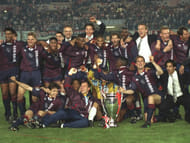Some months, less than 15 years ago, in the Spanish city of Barcelona, the world witnessed a crop of homegrown players lift the European Cup in the most emphatic fashion as you are ever likely to see. An FA Cup triumph and a Premier League title win supposedly acted as a propeller for these youthful set of men.
After conceding early through a Mario Basler free kick, Bayern Munich seemed destined for tasting European glory once again and claim a treble of their own. But the group of young lads from the city of Manchester had other ideas on their minds. Owing to what has been heralded as the most enthralling comeback of all times, Manchester United became the first British team ever in the footballing history to win a treble.
This lot, that went down in history as the best host of homegrown players a team has ever developed, comprised of David Beckham, Paul Scholes, Ryan Giggs, Nicky Butt and the Neville Brothers.
These kids, who were born and bred in areas in and around Manchester, shared a common vision, a common dream. But what separated them from all the others was that they believed in themselves and each other. Under Eric Harrison, the boys had laid their hands on the FA Youth Cup of 1992 and famously went on to achieve the inevitable and the unfathomable. They had been together arguably since the very first day they kicked the football and along with some others such as Robbie Savage and Keith Gillespie, the Class of 92 or ‘Fergie’s Fledglings’ etched their names into the annals of time in astounding fashion.
15 years have fleeted past since the Nou Camp was pumping with a substantial number of euphoric Manchester United fans, and currently the scenario has undergone a complete turnaround. Although, each club has an academy of their own, they can never come close to achieving what the Class of 92 did. Young players emerge through the ranks and announce their arrival on the scene almost every single week and as the transfer window approaches, they are on the radars of the biggest clubs in the world. And thanks to the buying power and financial prowess of the so-called ‘powerhouse’ clubs, we never see them earn something unique.
Southampton’s case
The recent case of Southampton can be treated as an example. The rollicking campaign of the 2013-14 season didn’t cease to act as an eye opener, not just for the Saints fans but also for the bigger English clubs. Adam Lallana and Luke Shaw, who were academy graduates were eventually snapped up by Manchester United and Liverpool respectively. James Ward Prowse and Jack Cork who’ve been at the South Coast based club, could well be the next big ones coming through, not taking into account the recent showings of Sadio Mane, Dusan Tadic and Graziano Pelle. A breakout season and the bigger clubs would be sniffing around the home grown lads. Even West Ham had such a setup almost a decade or two ago and we were preyed by Chelsea, Manchester United, Tottenham, and Liverpool.
Ajax in the 1990’s
The Dutch knack for granting players with the perfect foundation to develop has earned laurels since football became a global sport. When they triumphed in the European Cup under Louis van Gaal in 1995, their side comprised of a mammoth amount of homegrown players including Frank de Boer, Edgar Davids, Frank Rijkaard and Clarence Seedorf and guess what? All of them caught the eyes of clubs such as AC Milan after this title win and landed them successfully despite Ajax carrying a reputation of being a major European club.
It can be said that it was during this time that the role of money started changing in football and the importance of blooming talents underwent an erosion. Although, United did manage to hold onto their Class of ’92 players, it was all down to the fact that they succeeded in retaining or upholding their status of being a ‘top European club’ but Ajax’s case was quite the opposite and they ended up having to selling their homegrown players once the foreign clubs came calling.
Tottenham’s instance and the demise of the Invincibles
On recent evidence, when it comes to blooming players who went on to claim world acclaim, Tottenham can be considered another prime example. A hub for British players formerly, Spurs went on to finish 4th in the 2009-10 season and played out a dream debut in the Champions League campaign which was eventually halted at the hands of Real Madrid. After that Champions League run, everybody expected Redknapp’s Yid Army to kick on but they couldn’t. And Real Madrid pounced onto the two prized assets of theirs- Luka Modric and Gareth Bale who were among the nominees for the Balon D’Or accolade this year. Just when things looked bright for the North London side, they looked dim as ever the next. Their expectations and stature were big but couldn’t be fulfilled and when you’re a big club but not as big as Real Madrid, you’re flirting with danger.
Tottenham’s fierce North London rivals Arsenal have overcome their decade old trophy drought just off late. But after their ‘Invincible’ feat of 2004, they could never mount a title charge and they can’t do that even now. Their youth setup isn’t at fault in this. It’s one of the most renowned academies in the footballing world and the faculty is capable enough of producing young players.
But the brand name they go by – Arsenal automatically skyrockets the expectations of fans and their players. Robin van Persie, Alex Song, Samir Nasri and Cesc Fabregas or even Alex Hleb were players who had an almost astounding reputation and for once, wanted to win the Premier League title. They knew that Arsenal were a side capable of winning the title, but since the club fell short of meeting the expectations of the players it had, they failed in holding onto them. Every single player out of the above ones have won a prominent title since departing Emirates.
Arsenal’s case isn’t as unique as Ajax’s. Borussia Dortmund suffered a similar fate even after winning two consecutive Bundesliga titles majorly because of not carrying a reputation as colossal as Bayern Munich in Europe and ended up losing out on Shinji Kagawa, Mario Gotze and Robert Lewandowski.
Clubs such as Real Madrid, Barcelona, Manchester United and off late Bayern Munich, have an alluring amount of attraction level and with the amount of money that’s coming into football, no player or club is spared off. And although, money is increasing the competition in the game and garnering more viewership from the fans, the youth setups and the work that is put in to develop players for one club goes down the drain for the club which owns the player. It becomes a case of working for other clubs, who are destined to buy world class players.
Barcelona are different
Barcelona are a club who are a mixed bag when it comes to such situations. Their academy – La Masia produces a conveyor belt of youthful talents and, on the other hand, they never shy away from competing with Real Madrid or Bayern Munich in the global market for players. Almost more than half of the players in their squad have climbed through the ranks at Barcelona while others such as Luis Suarez, Thomas Vermaelen, and Neymar are foreign imports. But Barcelona are a club who always pop up at 1st or 2nd in the La Liga every season.
The players know that they are certain to do well in Europe and have quite a decent opportunity of winning the domestic title. The expectations of the players always match those of the club and that’s why Barcelona don’t end up selling top-drawer talents.
Feyenoord and PSV are clubs who haven’t had the lion share of success and both Stefan de Vrij and Martins Indi left for Lazio and Porto respectively because both are slightly major European teams. Apart from Ajax, no other side has imposed it’s legacy over the Eredivisie in a substantial manner.
It has to be said that football has changed a lot since 1999. Earlier, we hardly saw a player swap teams after playing out just a season at their old clubs. But these days, it’s become a rather common sighting to see a player join a club and leave it the next season.
More so, the scouting system of the bigger clubs has augmented in such a manner that the club sign young players without having seen them play 20 times a season, take Calum Chambers as an example. Money flows have become so fluid in football that we see a James Rodriguez join Real Madrid and Angel di Maria leave to make room for him. And the only reason left to speak out after such a thing is- Di Maria was surplus to our requirements.
It’s needless to say that something resembling the Class of ’92 would be nothing but impossible in modern day football. Even if it is possible, it would require immense resilience and resolve of last year’s Atletico Madrid from the club that produces the young guns who are ready to dazzle the world with their flair and panache.


